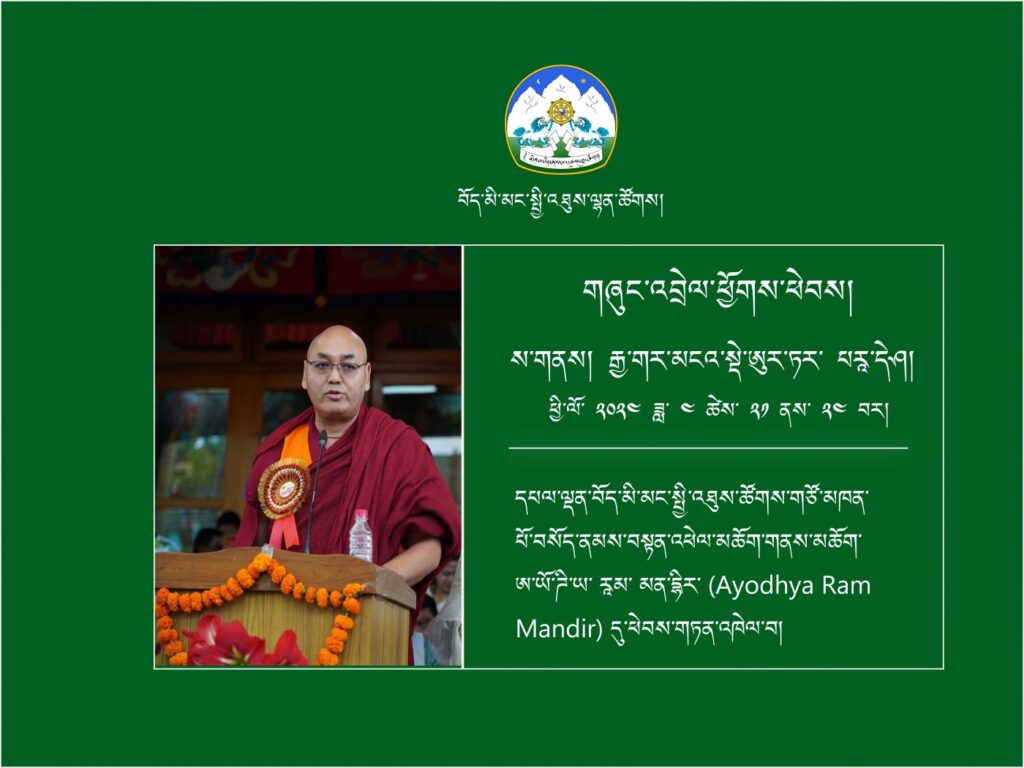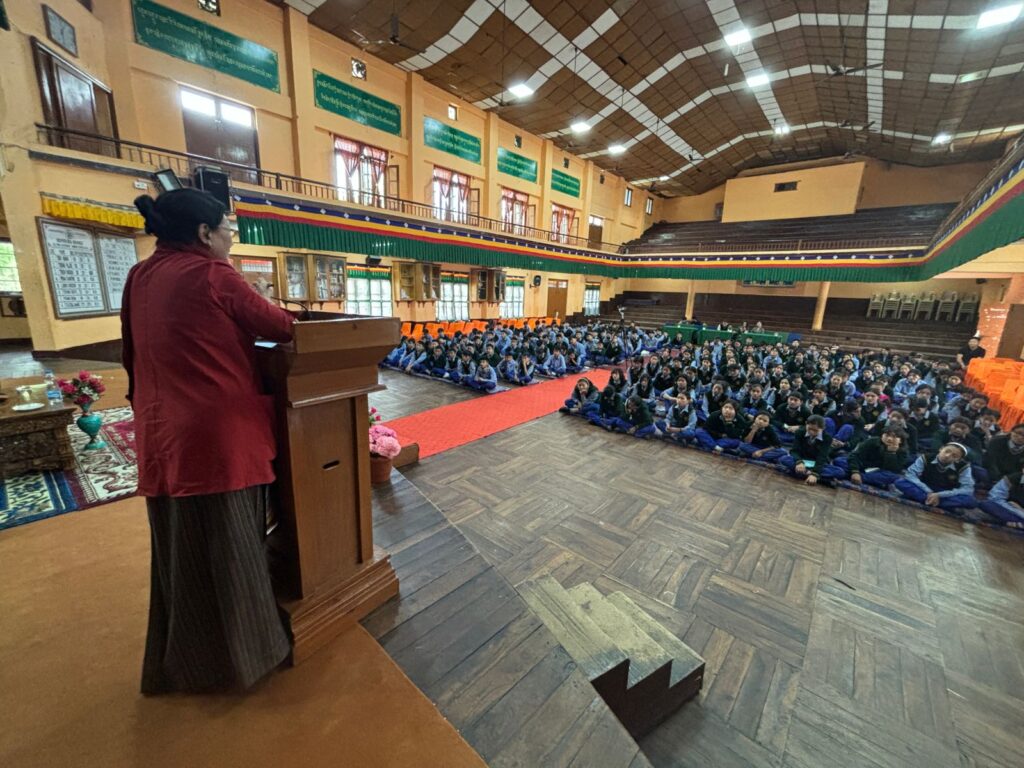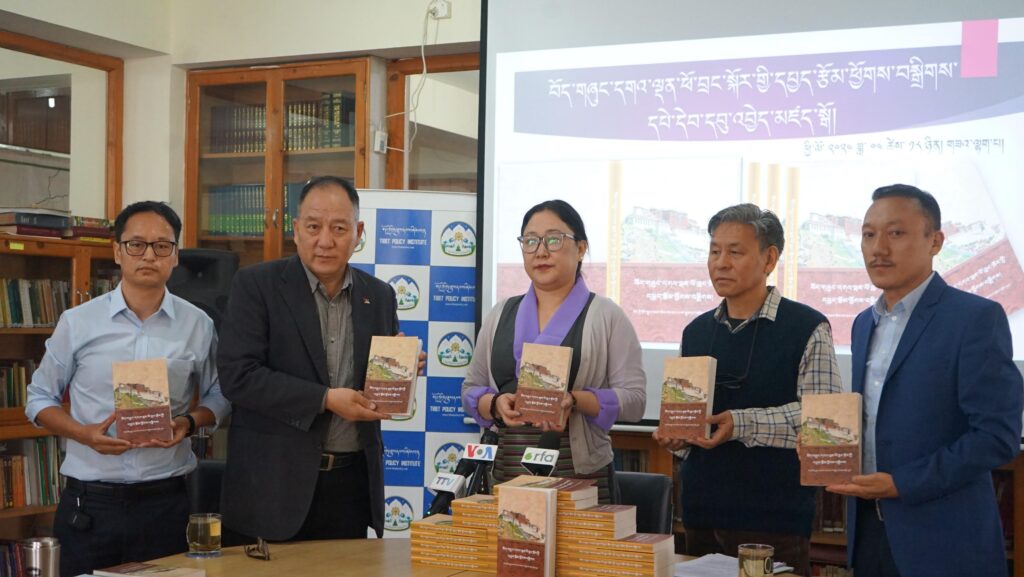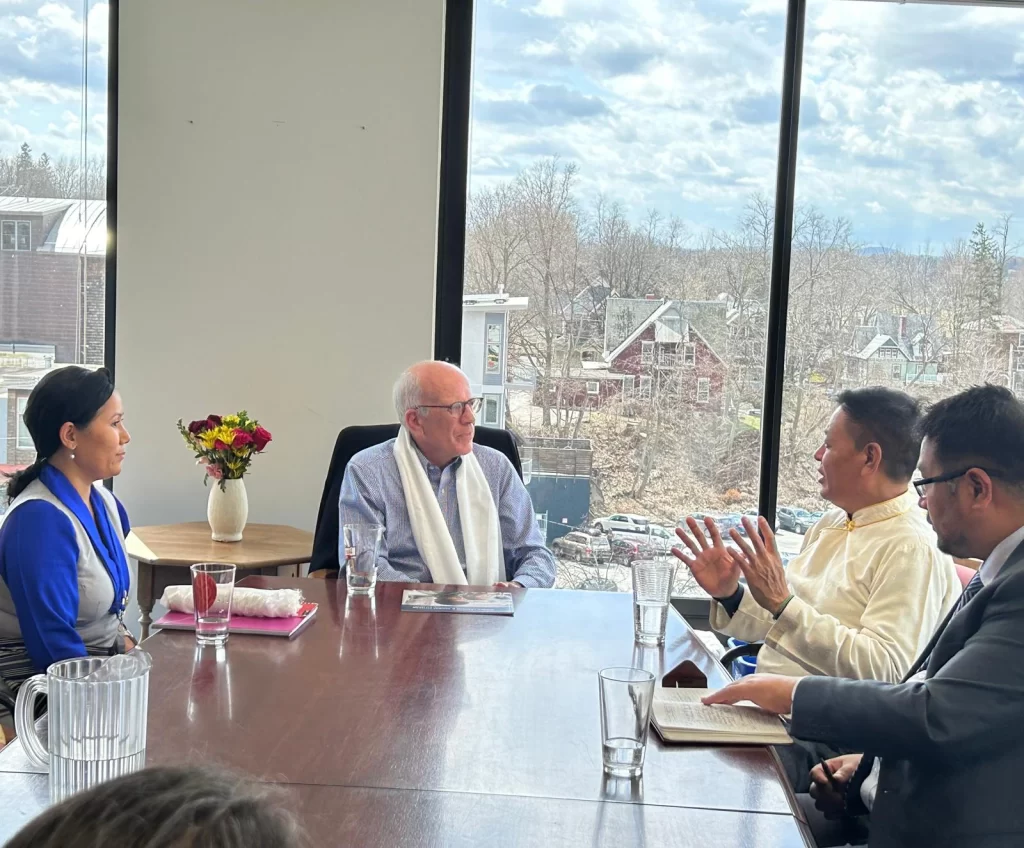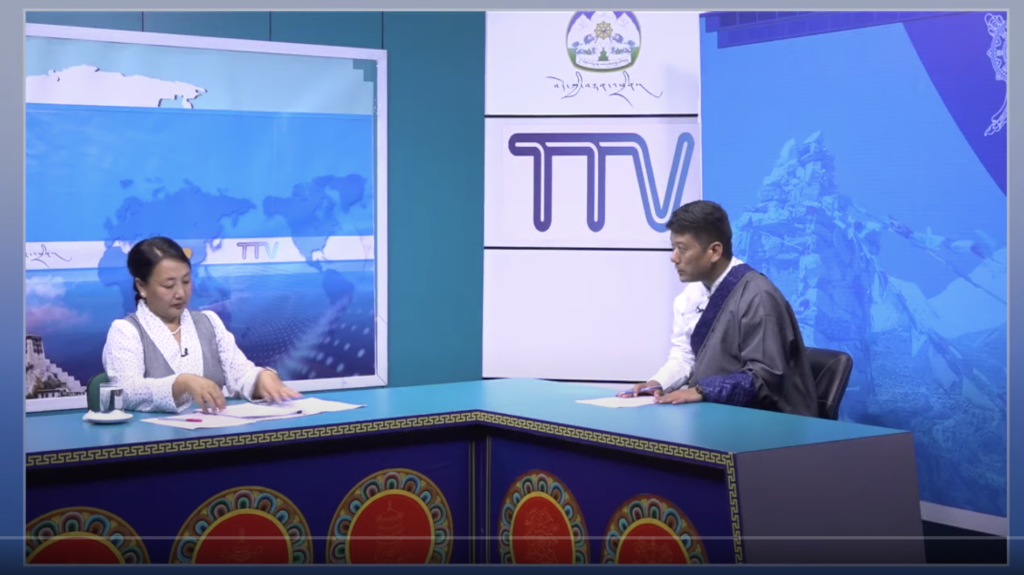
15th Kashag Completes Four Years in Office: Exclusive interview with Education Kalon Dr Pema Yangchen
Dharamshala: On the occasion of the completion of the 4th and the penultimate year of the 15th Kashag, Kalon Dr Pema Yangchen, Department of Education speaks with Tenzin Wangchuk, Tibet TV on the achievements of Education Department under the 15th Kashag and discusses key priorities in her final year in office.
Following is the English translation of the interview with the Kalon, originally conducted in Tibetan. Watch here.
Tibet TV: Could you walk us through the department’s initiatives and its significant accomplishments in the past 4 years?
The Department of Education is divided into the Administrative section, Traditional and Modern Academic Section, Scholarship section, Counselling section, Publication section, we consider all the sections equally important but the size of staff is based on the scale of the undertaking.
The regular initiatives under the department are students’ education development, modern and traditional education, teacher and administration development, parents’ role in supporting students’ education and in accordance, the department reaches out to them to make them aware of the department’s initiatives.
The academic section oversees many undertakings, among which exile Tibetan education association and education guidance council is responsible for holding annual meetings to discuss strategies to improve education in schools and implement it in counselling and subsequently, conduct workshops on the same, and publish handbooks for widespread dissemination.
Promoting awareness of the education policy is the responsibility of the academic section who compile relevant education policy documents and publish them, with so far 3 books published. Similarly, they conduct workshops for counsellors in schools and in turn, counsellors provide the teachers and parents with workshops as parents are important stakeholders.
We have implemented Secular ethics initiative across schools, the Secular ethics mentor of the department, Geshe Yeshi Gyaltsen tours settlements all over India and Nepal to create awareness about its importance among students, parents and the general public. In Dharamsala and in southern settlements where 2 sacred Tibetan Buddhist religious seats are situated, His Holiness the Dalai Lama spoke exclusively on the necessity of secular ethics to a gathering of 600 teachers from a group of schools.
The academic section undertakes the development of new textbooks and other learning materials and school curricula, e.g., it develops and prints textbooks in Tibetan, Mathematics and Science and translation from other languages and creation of children’s stories along with the publishing of Gangjong and Phayul series.
Last year, under the literature skills development programme, the 2nd language, i.e., English which is introduced from class IV, the available curricula were reviewed and new curricula developed for classes IV to VIII. My background in the teaching line and further studies abroad has enabled me to participate in the development of the curricula which has been very fulfilling personally.
Education council has formed a 5 person committee for the development of an education framework with practical execution in consideration. The council toured schools to refer the stakeholders: students, teachers and the administration on the matter. A total of 22 classes, 1000 students, 45 teachers and 24 administrators’ inputs were regarded in the compiled report for study. We modelled the framework on the Western educational system, in line with our educational policy and guidance methodology and with the report compiled from our expedition forming the base. We were able to incorporate the inputs of administrators from the settlements in the south and Dharamsala, however, the pandemic restricted us from visiting the schools in Northeast regions and Uttarakhand.
To generate interest for Tibetan language among small children, a website “Bodyig lobjong.com” was created for primary school children wherein all the classes taken are available. In addition, Sherig textbooks, and translations, along with Tibetan textbooks are accessible on the website for reading or download. In 2018, a Secular ethics programme was produced, which included scholar’s teachings and workshop materials. The volume of users for “Bodyig lobjong.com” has nearly tripled during the pandemic-induced lockdown since March and we provide additional materials for users benefit.
For Tibetan language and culture schools run by Tibetan community abroad, the Department’s education council conceived the development of Tibetan language textbooks in 2012, which materialized in 2017, after US-based Tenzin Norbu Nangsa coauthored a Tibetan language textbook. In accordance, the Education department formed a review committee and writers’ committee which worked since 2014-2018, publishing texts for classes up to V in 2017. The language textbooks are now available for preprimary level through classes VIII, with print-ready curricula on the website for classes VI-VIII to cut additional delivery costs.
In 2018, in coordination with the US-based Office of Tibet, the Education department arranged the first teacher training for the teachers at language and culture schools based in North America, in Minnesota and later, in New York where I was one of the trainers. In 2019, the first conference for language and culture school teachers was held where we created a framework for universal application across schools for systematization. Reading is recognized as the primary concern in the framework as Tibetan speaking becomes less of a problem due to interactions at home. So we have appealed all those schools to use the framework as it will ensure systematization.
On account of the pandemic-induced lockdown, we are conducting online classes and others to promote remote learning, e.g., for classes IX-XII we have arranged virtual classes by arranging school teachers to create learning materials which are uploaded on Sherig account on youtube, where 472 such videos have been posted. Similarly, for middle school classes learning materials are uploaded by Sambhota and TCV school teachers for Mathematics, Tibetan, Science and English. For primary and preprimary schools, the classes are oriented towards parents so that they might facilitate children’s learning in accordance with the needs of the time.
Traditional and modern education section oversees among its chief initiatives, the children’s reading skills development programme, I regard as one of our achievements. It has been able to promote awareness among parents as well, rather than limiting it to only students and teachers. Around 2.5 lakhs of storybooks for children have been distributed by the department to promote home and classroom libraries which include learning materials such as painting and storybooks. The number of classroom libraries across schools was at 224 in 2018 which rose up by 30 in 2019 and provisions for 60 home libraries were made. In addition, workshops for library superintendents have been conducted.
The teacher training programme under which workshops were provided for primary, preprimary, middle school teachers, including extracurricular subjects like drama and sports. Individual schools have their own programmes for teacher skill development which we facilitate by providing learning materials annually.
Under the Tibetan language skills development initiative, we provide workshops for Tibetan teachers, research opportunities, Tibetan language skills improvement for teachers from other subjects along with holding essay writing competitions for students, with 3 held so far from 2016-19.
As technology usage becomes more intensive, a hidden blessing of the pandemic-induced lockdown has been that teachers are required to see the importance of modern technology knowledge and education relevant to the times. Under the ICT project of the department, workshops for teachers are conducted and tablets and internet facilities are provided at schools. In 2020, 22 classrooms with 1 from Sambhota and 2 from TCV schools received the provisions. In accordance, teachers were provided with workshops to guide students in their application.
Science and mathematics development workshops have been initiated to bring up the quality of learning. At the annual, national science and mathematics fair where around 100 students from across India participated, 11 Tibetan students were selected.
Considering the importance of the skill training of preprimary school teachers, we have held workshops in the Montessori system, providing teaching guidance for mathematics, technology provisions and including teaching methodology. Online workshops were provided to the administration for leadership and nurturing abilities amidst the pandemic restrictions. An annual programme for students that is the leadership workshop for students of class X was disrupted this year due to the pandemic. Last year, there were about 137 girls, 126 boys and 28 teachers who participated.
Recognizing the importance of the parent-teacher committee for students’ success, workshops are held periodically where the goals and responsibilities are discussed. The Education department’s 7th conference was held in 2019.
The scholarship section facilitates the pursuit of higher education in India and abroad which has seen a steady rise in recipients from 1000 beneficiaries in 2015 to 1150 in 2019. Besides Sherig scholarship, supplementary scholarships such as the Dalai Lama, THS Mussourie and TCV scholarships are provided by Sherig which encourage students to pursue their educational aspirations.
Another achievement of the department has been the reservation of the medical seats for Tibetans by the Indian government which was previously allotted to 1 Tibetan student in 2015, and saw it increase to 3-5 in the subsequent years which has produced Tibetan doctors within our community.
One of the most important programmes is the US further studies scholarship which was initiated in 1988. In the past 5 years, the number of selected students have been 8-11, this year 7 beneficiaries have returned after finishing their studies to serve the Tibetan community. For school students, UWC is an important scholarship programme. In 2016, 2 seats were reserved for Tibetan students which has since increased to 3 in 2017, 5 in 2018 and 7 in 2019. The funds for this programme has increased over the past few years.
The guidance counsellor provides educational and psychological counselling. We have been able to appoint a counsellor at Sambhota school and similarly, for parents counselling and guidance workshops are provided to teach them about the importance of supporting their children mentally and with education goals. Similarly, leadership workshop for students is held and for college students separately. We have created a framework for guidance counselling with the final draft reviewed and in the process of distribution. Annually, orientation programmes are held for college admissions where Indian guidance professionals are invited to guide about colleges.
The Terminology section, under the department, holds 3 conferences annually where they review new terms proposed and compile it for publication. They have developed a website to ease word search and an application subsequently for mobile phone installation. To promote awareness about the same, they tour settlements to increase awareness about the initiative and in the department as well.
Tibet TV: What are the initiatives undertaken by the Education Department for the Tibetan community in Nepal?
Under the Gangchen purview, there are 9 schools established in the region. In addition, Sherig publications provide textbooks for schools. Similarly, class XII graduates are provided with scholarship funds reserved for 15 seats: 10 for further studies and 5 for vocational training programmes. Likewise, 1 seat is reserved for student from Nepal for scholarship to the US. For initiatives covering infants and schoolchildren, we spend around 9 lakhs. The Terminology section promotes awareness in Nepal as well and scholarship section provides facilities for promoting awareness about scholarship initiatives. The provision for workshops is extended to Tibetans in Nepal like the guidance counselling workshops and workshops for preprimary school teachers which saw participants from Nepal. Under the department’s initiative and as per requests from the Tibetans in Nepal, the department staff undertook an education assessment of schools.
Aid agencies like the USAID and PRM and funds from Canada have supported the children’s reading initiative and teacher training, modern technology skills, guidance counselling, preprimary education development, nutrition and health programme, which constitute 6 millions in expenses for the Education department.
Tibet TV: In the past 4 years, were there any issues and challenges that the department had to face and how did you overcome it?
The challenge at the outset is the declining number of students in schools which keeps dropping each year, an obvious problem. At conferences of the department and school administrations, we discuss how to overcome it by finding an internal solution from respective schools such as consolidating schools, within settlements, etc as it is imperative to discuss.
Simultaneously, the number of staff is seen rising disproportionately and in such a scenario, it is not viable. However, on the positive side, the lower the teacher-student ratio means we could focus on the improvement of the quality of education. As teacher-student interaction is crucial for the quality of education, evidenced by the year-on-year improvement observed in the results of classes 10th-12th and the provisions made.
As it is apparent to all we need to form a strategy, then implement it by doing what is necessary and plan annually in preparation for the coming years.


